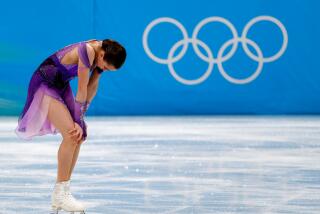Shotput Winner Tests Positive
- Share via
ATHENS — Even a return to the hallowed environs of ancient Olympia could not save track and field from its scandal-ridden self.
The first woman to become a champion at a site where only men were allowed to compete in the ancient Games has tested positive for steroids.
Russian Olympic Committee spokesman Gennady Shvets told Associated Press that Irina Korzhanenko tested positive for stanozolol, the same steroid that cost Canadian sprinter Ben Johnson his gold medal in the 100 meters at the 1988 Seoul Olympics.
“Nobody can believe that this is actually happening,” Shvets said.
“This is very sad,” a track official said, speaking on condition of anonymity.
The International Olympic Committee had no comment, according to spokeswoman Giselle Davies. The IOC executive board has jurisdiction over all doping violations that occur during the Olympics. The executive board is expected to get the case today, a source said.
Korzhanenko, 30, lost her silver medal at the 1999 World Indoor Championships after testing positive for drugs. She was banned for two years.
If this test is confirmed as a doping offense, she faces a lifetime ban. Cuba’s Yumileidi Cumba would inherit the Olympic shotput gold.
The case would be another blow to the reputation of track and field in general and the shotput in particular.
Yanina Korolchik of Belarus, the Olympic women’s shotput champion four years ago in Sydney, could not defend her title because she was suspended for doping.
All three of the 1992 men’s shotput medalists had previously served doping suspensions. Two of the three 1996 medalists had previous suspensions and subsequently were given lifetime bans for a second offense.
“I don’t think we could be in a worse situation,” said Gail Devers of the U.S., an Olympic gold medalist in 1992 and ‘96, referring to her sport’s recent rash of doping scandals.
“This is the worst I’ve ever seen. It’s all over the news, and they talk about that before they talk about gold medals.”
News of Korzhanenko’s positive test came on the same day a Greek weightlifter, Leonidas Sampanis, became the first athlete of the Athens Games to be stripped of a medal for a doping offense.
Sampanis lost his bronze medal in the 137-pound (62-kilogram) category after testing positive for testosterone.
So far, nine weightlifters have failed drug tests. A Kenyan boxer also was sent home for using drugs. With a week left in the Games, including track and field events, more positives are possible.
“The testing is more extensive and more comprehensive, so you’d expect we would catch more athletes that are cheating,” Dick Pound, the World Anti-Doping Agency chief, told Associated Press. “It increases the confidence in the authenticity of the competition if we are taking people out who cheated.
“I think drawing attention to this problem is good. If you have a Games where you catch a lot of people, that’s fine.
“That’s the message we want to send: If you want to cheat, don’t come here.”
Referring to the high number of positives in weightlifting, Pound said WADA and the IOC should put pressure on the international federation to act. The federation says it is cracking down, weeding out cheaters before they compete.
Associated Press contributed to this report.
More to Read
Go beyond the scoreboard
Get the latest on L.A.'s teams in the daily Sports Report newsletter.
You may occasionally receive promotional content from the Los Angeles Times.






